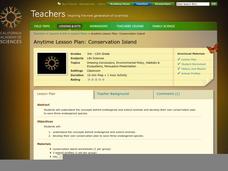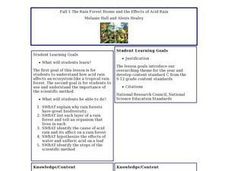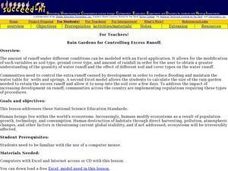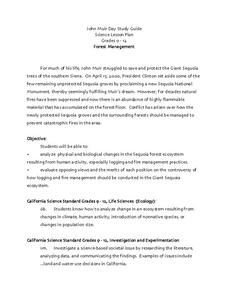California Academy of Science
Conservation Island
Why not walk in the footsteps of Teddy Roosevelt and become a conservationist? After discussing issues and reasons for animal extinction, the class creates their own conservation plans. Each small group is given mock data regarding a...
Curated OER
Acid Rain
Create a simulation of acid rain in your classroom with lemon juice and bean plants to help kids study the effects of pollution on plants. In addition, learners will listen to a story and write responses based on guiding questions.
Prince William Network
The Incredible Journey
Divide your school gym into breeding grounds and non-breeding grounds so that your zoologists can play a game simulating the seasonal migration of shorebirds. Players pick one of the included game cards and follow its directions, which...
Curated OER
Fall 1-The Rain Forest Biome and the Effects of Acid Rain - Biology Teaching Thesis
High schoolers explain why rain forests have great biodiversity, and list each layer of a rain forest and tell an organism that lives in each. They identify the cause of acid rain and its affect on a rain forest. Students hypothesize the...
Curated OER
Survival Of The Fittest
Seventh graders examine the concept of an ecosystem and how there is a variety of representations of life that exist there. They look at the equilibrium that is reached in stable communities and how the variable of change in...
Curated OER
Discovering the Oasis
Students focus on the types of vegetation and animal life living around local water sources. This lesson can be adapted to any local water source, whether it be a lake, a river, stream or ocean. It has a particular focus on the bird...
Curated OER
Survivor
Seventh graders investigate changes in the ecosystem within the school year. They see that ecosystems, communities, populations, and organisms are dynamic and change over time. They, in groups, collect data in quadrants in the fall,...
Curated OER
Gwynns Falls
Students investigate the question: What is the impact of urban development and expansion on the health of a decidious forest ecosystem and humans? They examine the issue of land development by responding to a specific scenario and...
Curated OER
Rain Gardens for Controlling Excess Runoff
Students address the idea that human beings live within the world' ecosystems. They discuss how humans modify ecosystems as a result of population growth, technology, and consumption. Students discuss how the human destruction of...
Curated OER
Bat Habitat
Ninth graders engage in a lesson to find the role of bats in the complexity of certain ecosystems. They identify where bats live and the daily role played in the ecosystem. Students also construct a bat house to help control the...
Curated OER
Ecological Organization
Students examine the concepts in the ecological organization unit. For this ecological lesson students explore news articles that have to do with the study of ecology.
Curated OER
Fisheries Research Methods
Students explore how scientists keep track of fish populations and why it is important to do so. They describe three methods currently used to sample fish populations. They participate in activities to simulate several of the sampling...
Curated OER
Illinois' Habitats Happening
Students use the scientific inquiry method to examine the ecosystems and biomes in Illinois. Using the characteristics of a local habitat, they identify the best conditions for an ecosystem to survive and how a slight change can damage...
Curated OER
Introduction to Simulation Project
Students create a simulated self-sustaining ecosystem. In this biology lesson, students examine the different food chain and ecosystems in their model. They recommend some improvements and changes to an existing ecosystem.
Curated OER
Land Use
Students examine ecosystems that covered Illinois 200 years ago, investigate some living and non-living components of ecosystems, identify components of prairie system, create food webs, and observe human effects on environment. Lessons...
Curated OER
A Living Watershed
Students, through this series of lessons, use local resources, speakers, print and video materials, as well as standard text materials to study the ecosystem of the local watershed.
Curated OER
The Effect of Medications on Daphnia
Students explore how human beings affect the world's ecosystem by examining the affects of medication on daphnia, a small freshwater organism very sensitive to pollution. Students use a computer model to repeat the experiment and analyze...
Curated OER
Forest Management
Young scholars explore the changes in the Sequoia forest ecosystem. They evaluate reasons for the changes and discuss opposing views of human activity, logging and fire management practices. Students observe a video, describe the...
Curated OER
Identifying trophic levels and the skeletal system through Owl Pellets
Students identify a food chain sequence. They compare, identify, and record the rodent skeletal parts to a rodent skeletal diagram. Students construct a rodent skeleton from the skeletal parts found in the pellet. They are given the...
Curated OER
A Coastal Arctic Food Web
High schoolers create a food web of the arctic ecosystem. In this biology lesson, students explain how global warming affects this ecosystem. They explain how losing a species affects the entire community.
Curated OER
Vocabulary: Kansas Prairies
Students explore the ecosystem by reviewing scientific vocabulary terms. In this environmental awareness lesson, students identify the differences between abiotic and biotic factors and their relationship to the Earth. Students define...
Curated OER
It's all Interconnected
Learners participate in a number of activities to investigate the food web, species extinction, predators and prey, and biological diversity.
Curated OER
Ecotourism in National Parks and Wilderness
Learners develop a plan for ecotourism after researching a nearby national park or wild area.
Curated OER
Reading the River
In collaborative groups, young ecologists measure the temperature, pH, and dissolved oxygen for three different freshwater samples. They examine each sample with a microscope and record observations on the microorganisms in the pond...























